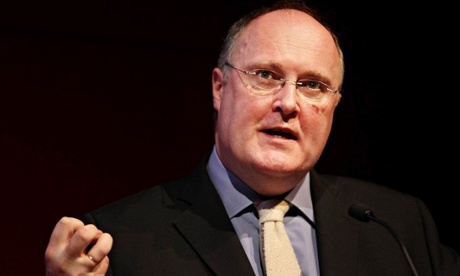
For Alan Davey, becoming controller of BBC Radio 3 will be a dream job. Not least because it means a gracious exit from his old role. As Chief Executive of Arts Council England since 2008 he has been obliged, as a result of deep coalition cuts to the body’s budget, to preside over job losses within the council itself and hugely painful cuts to arts organisations.
More importantly, though, Davey is a music nut. As a kid, growing up the son of an electrician in Stockton-on-Tees, it was punk that caught the 53-year-old’s imagination. The first time he heard an orchestra, it was as a student in Birmingham – Simon Rattle conducting the City of Birmingham Symphony Orchestra. Davey, who was studying medieval and modern English, was smitten and used to go as often as he could to the CBSO’s Tuesday and Thursday concerts, where you could sit in the choir seats for £2. That was his musical education. When he arrived in London he wrote a furious letter to the Observer about the quality of the London Symphony Orchestra: “Session men on autopilot” was the headline (he has made it clear that things have changed for the better since).
Davey, then will bring to the job a real love of classical music, and in particular of the symphony orchestra. This is a man who, in 2008 when I interviewed him, had 3,500 CDs and 750 LPs in his collection. I expect the collection has grown. He is also a man who has spent his career in bureaucracies – at the department of health, the department of culture and latterly Arts Council England. He knows how to operate in these environments; he knows the language. This will be a huge advantage as he attempts to master the byzantine ways of the Beeb with its crowded responsibilities for music, radio and the arts. He will need to forge a good relationship with his immediate superior, Helen Boaden, director of radio, and negotiate precisely what it means that the BBC now has a director of music in Bob Shennan, a new appointment Tony Hall made shortly before Davey’s predecessor, Roger Wright, announced his abrupt resignation. Davey’s job will involve presiding over, and fighting battles for, the five BBC orchestras, increasingly vulnerable as the BBC is forced to implement funding cuts (with possibly more on the way after charter renewal, due by January 2017). Within ACE, Davey had a quiet reputation for fighting covert battles for classical music against the claims of other art forms. He will need all the arguments at his disposal.
As far as the work of actually running Radio 3 goes, my suspicion is that he will not rock the boat too much. Davey is a serious-minded lover of music. I would be surprised if he took the station downmarket or strayed (further?) into Classic FM territory. Within the BBC itself, audience figures are not the main priority for Radio 3 – this is the network that is pushed out to prove the corporation’s intellectual credentials at charter renewal time, the most obviously Reithian of its networks. The big missing element from Davey’s CV is broadcast experience, which to some might make him a peculiar choice for the job at all; it certainly means that he is an unknown quantity in terms of what we will hear when we hit the Radio 3 dial in future. Presumably in the short term he will be heavily reliant on trustworthy lieutenants such as Matthew Dodd, head of speech programming.
The big question mark that will loom at once is what to do about the Proms. Wright was both controller of Radio 3 and director of the Proms. The jobs are sometimes, but not invariably, occupied by the same person, and the job spec for Davey’s role made it clear that the successful applicant would appoint a Proms director. Assuming that Davey will not want to appoint himself, he now has the chance to bring in a brilliant mind to programme this greatest of classical music festivals – and, perhaps, start gently to reinvent it. The Proms are a huge brand – bigger than Radio 3 – and, whatever the ghastlinesses of the Last Night rituals, a genuinely popular celebration of live classical music. Davey might think about appointing Tom Service (declaration of interest: Service is a Guardian writer) whose broadcast experience, extraordinary fund of ideas and missionary enthusiasm for music would make him a fascinating choice. Lacking management experience, he was an unsuccessful candidate for the controller job, but could be a great fit for the Proms.

